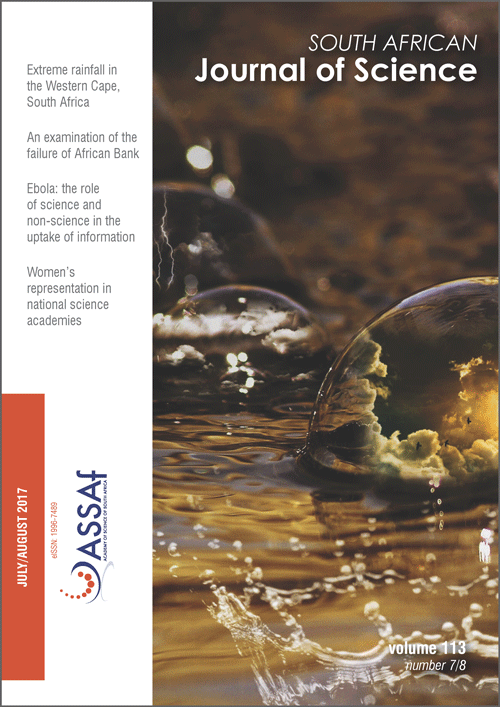Scientific and non-scientific information in the uptake of health information: The case of Ebola
DOI:
https://doi.org/10.17159/sajs.2017/20160359Keywords:
EVD, social representations, traditions and religion, rumours and conspiracies, newspaper content analysisAbstract
The Ebola virus disease outbreak in West Africa (2013–2016) claimed over 10 000 lives in less than 18 months. Low levels of familiarity with the disease, ease of transmission, scale of infection, gruesomeness of symptoms, lack of cure and high fatality rate created a global panic. From the perspective of the social psychology of communication and content analysis, this study examines media coverage of the crisis in Africa with a view to unpacking the scientific and non-scientific information that may have framed public understanding of the disease. Findings show that accepting scientific advice was not unproblematic, because of the similarity of early symptoms with known diseases such as Lassa, dengue and malaria fevers. Cultural and religious actors and beliefs posed a paradox for believers as the public assimilated disease prevention information into existing norms and practices. Rumours and conspiracy theories about Western governments and pharmaceuticals also contributed to the rejection of the scientific explanation of its origin. Fear of the devastating effects of the disease and the lack of a cure led to the stigmatisation of the infected and treatment centres and ultimately to public revolts. Findings show the importance of non-scientific information and actors in matters of health and illness in Africa.
Significance:- Scientific knowledge is not enough to change health behaviour. Non-scientific knowledge and actors, traditional and religious practices, rumours and conspiracy theories must all be factored into efforts to address behavioural change.
Downloads
Published
Issue
Section
License

All articles are published under a Creative Commons Attribution 4.0 International Licence
Copyright is retained by the authors. Readers are welcome to reproduce, share and adapt the content without permission provided the source is attributed.
Disclaimer: The publisher and editors accept no responsibility for statements made by the authors
How to Cite
- Abstract 1700
- PDF 786
- EPUB 230
- XML 252
- Supplementary file 162













.png)